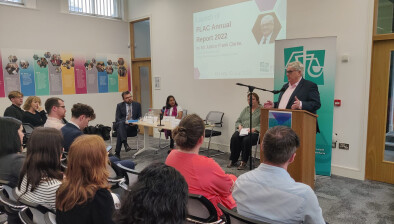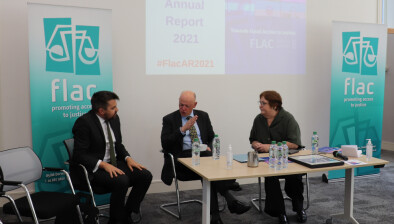High Court: Circuit Court decision quashed after judge failed to hear lay litigant’s submissions

The High Court has quashed a decision of the Circuit Court to dismiss an appeal brought by a lay litigant after the trial judge failed to let the man make submissions. The applicant had appealed a decision of the District Court which increased maintenance payments for his child from €60 to €125 per week, but the applicant claimed he was never served with the proceedings.

About this case:
- Citation:[2022] IEHC 196
- Judgment:
- Court:High Court
- Judge:Ms Justice Niamh Hyland
Delivering judgment in the case, Ms Justice Niamh Hyland held that the trial judge failed to hear the applicant’s submissions on service. Further, the trial judge was wrong to dismiss the appeal without substantively adjudicating on the merits, the court said.
Background
The applicant and respondent were the father and mother of a child. The child turned 18 in July 2021. The father had been paying maintenance of €60 per week to the mother. In November 2017, a summons issued for the variation of the maintenance order. In February 2018, the District Court ordered that maintenance be increased to €125 per week.
Subsequently, the applicant was arrested for not complying with the maintenance order. He was brought to Cork District Court and given a copy of the order. In September 2018, the District Court heard an enforcement application for the €125 maintenance, and, in November 2018, the applicant was granted an extension of time to appeal the variation of maintenance to the Circuit Court. The applicant claimed that he was never served with the summons or the order.
In July 2019, the matter came before the Circuit Court. The applicant represented himself and began by raising his point that he had not been served with the summons to appear at the variation hearing in February 2018. Accordingly, he did not attend the hearing. The respondent, who was represented, submitted that the applicant had been served with the proceedings.
When the applicant attempted to outline why he had not been served, he was interrupted by the judge. It was held that the District Court would not have heard the maintenance application without being satisfied as to service.
The judge then moved to consider the substantive question of maintenance. The applicant sought an adjournment in circumstances where he had made an application to the Legal Aid Board the previous week. Further, he explained that he thought the appeal was only dealing with service on that date and he requested an adjournment to provide and updated statement of means.
The court heard that the matter had been in 22 times to deal with maintenance. The court held that the previous order was made over a year ago and the trial judge would have to “start all over again” to hear the appeal. As such, the court decided to strike out the appeal so that the applicant could apply to the District Court to vary the matter.
The applicant later issued judicial review proceedings seeking to quash the decision on the basis that the trial judge acted in breach of fair procedures by failing to hear his submissions and determining the matter without a substantive hearing. The applicant was represented at the judicial review.
High Court
The High Court began by setting out the transcript of the Circuit Court hearing. Based on the contents of the transcript, the court concluded that the judge did not give the applicant an opportunity to make his arguments on service and rejected his point out of hand.
Further, the court held that no substantive decision was made by the trial judge on the application. Although the parties relied on several authorities relating to the entitlement of a court to refuse and adjournment, the court observed: “In truth, the applicant’s legal rights were affected not because of the refusal to grant an adjournment but because of the refusal to hear the case.”
It was a matter of fundamental fair procedures that an appellant in the Circuit Court should be given the opportunity to make their submissions, whether in a family law case or any other context. This point was emphasised by the case law (JN v MJE [2009] 1 IR 146; In Re Haughey [1971] IR 217).
The trial judge accepted that the applicant was entitled to argue service per se and the court engaged substantively on the issue. However, the judge simply did not allow submissions to be made. Although there were potential infirmities with the applicant’s point on service, the court should have permitted him to make his submissions and issue a ruling.
Considering the substantive issue of maintenance, the court noted that it was “somewhat surprising” that the trial judge refused to hear the appeal because of the exercise required by the Circuit Court after such time had passed since the maintenance order. Although the judge was attempting to save time and costs by sending the case to the District Court, the applicant was denied his unrestricted right of appeal under the Courts of Justice Act 1936.
The judge was obliged to hear and determine the appeal and was not absolved of that approach simply because alternative routes were available, the court said. The court rejected the respondent’s submissions that the service issue should have been dealt with in the District Court. Even if the applicant was not entitled to appeal the issue of service, it did not explain why the court did not hear the applicant, the court said.
Finally, the court determined that the proceedings were not moot since the applicant’s son obtained maturity during the judicial review proceedings. It was noted that the applicant was still liable for arrears in maintenance in the amount of €11,500 and therefore there was still a live issue of controversy between the parties.
Conclusion
The court quashed the decision of the trial judge and remitted the matter back to the Circuit Court.
MM v LOC [2022] IEHC 196











